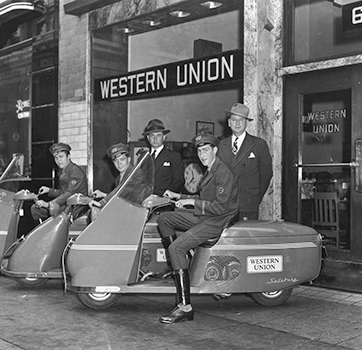•—•—• (End of Message)
July 16, 2013
—•— (Start message) The last telegram in the last country to maintain a national telegraph service was sent yesterday, closing a major chapter in the story of a system that dominated long-distance communication for more than 100 years. The final message, tapped out by Bharat Sanchar Nigram, India’s state-run telegram service, was transmitted 163 years after telegraph service was established in that country. The company said it could no longer compete profitably with Internet and cell phone messaging. Western Union ended its telegraph service in the United States in 2006. However, telegraph lines around the world have not been completely silenced. A Swiss-based company called Unitel Telegram Services reports transmitting tens of thousands of telegrams each month in more than 40 countries. According to the company, about half of its messages are sent to individuals, with businesses and diplomatic services accounting for the rest.
In an age of instant digital communication, it is difficult to appreciate the Earth-changing nature of the telegraph. Before the telegraph, most long-distance messages traveled no faster than the fastest horse. An exception was the semaphore method, in which a sequence of lights or other markers signaled from point to point. However, semaphore systems did not work well in bad weather. Even in good weather, they could transmit only a small amount of information.

Western Union messengers wait on scooters outside their office in 1940, ready for telegrams that need delivery. Western Union was the main provider of long-distance telegraph service in the United States from the mid-1800's until the early 2000's. (© American Stock/Getty Images)
The telegraph, which was an important means of communication from the mid-1800′s to the mid-1900′s, was the first instrument used to send messages by means of wires and electric current. Telegraph operators sent signals using a device that interrupted the flow of electric current along a wire. They used shorter and longer bursts of current, with spaces in between, to represent the letters of the message in what became known as Morse code. A device at the receiving end converted the signals to a series of clicks that a telegraph operator or a mechanical printer translated into words. The message was called a telegram if it was sent over wires stretched across land and a cablegram, or simply a cable, if it was sent through cables laid underwater.
The American painter and inventor Samuel F. B. Morse is credited with making the first practical telegraph in 1837. Morse received a U.S. patent for it in 1840. However, Morse’s invention built upon years of research and experiments by people who came before him. The text of Morse’s first telegram to his partner Alfred Vail was “What hath God Wrought?” •—•—•
Additional World Book articles:
- Signaling
- SOS
- Wheatstone, Sir Charles
- Woods, Granville T.
- Telecommunications (1924) (a Back in Time article)


